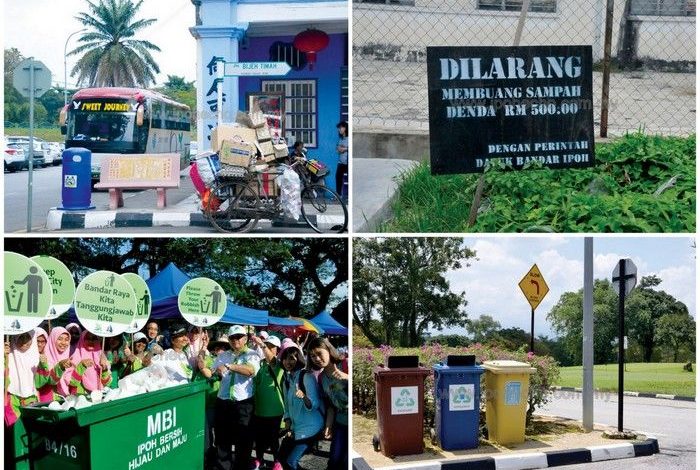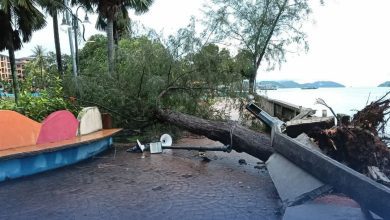

Cover Story
By Mei Kuan, Ili Aqilah and Khaleeja Suhaimi
Ipoh was recently named Malaysia’s cleanest city in 2016 ahead of Penang and 2015’s cleanest city, Johor Bharu. Based on the ministerial rating system, Ipoh scored 97.45. This was announced by the Urban Well-Being, Housing and Local Government Minister on August 14.
“When the rating system was first introduced in 2008, Ipoh scored only 3 stars, a decade later, 5 stars and was ranked first in the country. Ipoh is definitely the model to emulate when it comes to handling waste management,” said Tan Sri Noh Omar, Minister of Urban Well Being, Housing and Local Government during a ceremony held at Ipoh Convention Centre (ICC) recently. The other town in Perak that made it to the top ten is Manjung with 94.75 points.
Ipoh Echo sent its team to get feedback from Ipoh City Council, NGOs and members of the public regarding the award and determine whether Ipoh is indeed the cleanest city in Malaysia.


The Role of Ipoh City Council


His other efforts include erecting lamp posts along Kinta River, lighting up trees along the streets and planting new trees within city limits.
“In order to maintain cleanliness, the public must work together with us. What’s the point of getting five stars if we don’t play a part in achieving a sustainable environment?” said Zamri.
In conjunction with the Perak Yang Bersih (Clean Perak) campaign launched by Menteri Besar Dato’ Seri DiRaja Dr Zambry Abd. Kadir on March 31, the council has organised a dedicated cleaning campaign every third Friday of the month.
The campaign will be conducted throughout the year with different themes every month. The theme for August was Smart Partnership, September is on Green Run, October pertains to Car Free Day, November will be about clean rivers and landscaping while December is on recycled items.
A total of 74 gotong royong were held from the beginning of the year till August 12. A total of 10,876 illegal dumps were cleared.
Vandalism is a recurring problem in Ipoh. Those caught can be jailed for six months or fined RM1000.
In order to maintain the cleanliness, Ipohites should play their part. They should start by picking up rubbish they see on the ground. Most of us are of the impression that such simple acts amount to nothing.
We should start recycling instead of throwing away papers, plastics and aluminium. We do not realise how recycling can impact our lives.
The mayor has stressed a lot on going green and planting trees, in and around the city. In fact, every household is encouraged to have plants in their compound to increase the oxygen level in Ipoh.
Last year, Ipoh City Council in collaboration with Maybank planted 500 plants from Gunung Cheroh right to People’s Park.
“My gratitude and congratulations to Ipoh City Council for attaining this award. We’re very happy to achieve this and we hope to attain it every other year,” said Zamri at the August full-board meeting.
In order to maintain the 5-star status, Ipohites need to work hand-in-hand with the council. Upgrading the Kinta Riverwalk is imperative.
“We’ll improve the lighting and make things more conducive for tourists. The whole works will cost around RM4 million. My proposal is still being considered by the Ministry of Tourism and Culture,” Zamri remarked.
Role of Ipoh City Watch
Associate Professor Dr Richard Ng, President of Ipoh City Watch (ICW) cum Chairman of KOHIJAU shared his thoughts with Ipoh Echo on the matter, “The announcement caught Ipohites by surprise. Many accepted it with mixed feelings because there’s still a lot of illegal dumpsites in the city.”
“It’s not a surprise to me for many reasons. Firstly, Perak was declared the second cleanest state in Malaysia in 2016 by the Malaysian Tourism Board after Terengganu, based on certain criteria. Ipoh was also accredited by Lonely Planet as one the top 10 recommended destinations in Asia,” he added.


Among the criteria used include having strategic action plans, commitment to quality operations, innovations and creativity, use of ICT, integrity, good record keeping, handling of customers’ complaints and feedback, and media reports on activities of the council.
Compared to the other local councils, Ipoh City Council has scored the highest points based on cleanliness. This includes environment-control activities with a maximum score of 3.25 points, solid waste management and disposal, and cleanliness of public places such as People’s Park and toilets which score 1.75 points, handling customers’ feedback and complaints with a score of 5.00 points, and community involvement, which include conduct of LA21 activities for a sustainable environment which score 10.00 points.
Thus criteria for cleanliness have a total score of 20.00/100.00 or 20% of the Local Government Star Rating system. Out of these 20 points, Ipoh City Council scored the highest among all the local councils making Ipoh the cleanest city in Malaysia.
“Credit goes to the mayor, Dato’ Zamri Man whose leadership got things moving to achieve the various key performance indicators set. Nevertheless, our Menteri Besar Dr Zambry Abd Kadir should also be thanked for this success. He was the man responsible for making Perak and Ipoh what they are today. Perak will soon be the cleanest state in Malaysia.”
According to Richard, many critics have tried to belittle our MB labelling him the garbage man not knowing that by going down with the mayor and the workers, he was setting an example to all local council staff to take cleanliness seriously. Zambry also launched the Clean Perak campaign on March 31 setting the stage for Perakeans to follow.
Ipoh Car Free Day, launched two years ago by the council, tree-planting campaign and tree tagging have also contributed towards making Ipoh the cleanest city.
“However, much still needs to be done by the council and the state government if we want to retain the cleanest city status. These include effective enforcement to ensure that perpetrators of illegal dumping are caught and prosecuted. The current fine of RM500 does not deter these litterbugs,” Richard pointed out.
“All business outlets must have a rubbish bin each before their business licenses are renewed. Cleaning must also be done twice daily by council workers, as practised in China and Japan. The workers must also be monitored and given key performance indicators as a form of motivation,” he added.
“The council must ensure its complaint and feedback system is people-friendly and can be assessed in different ways convenient for the people. The complaint system must be managed by staff who are people-friendly. They should receive complaints and channel them to the respective departments to handle within a certain timeframe. Those who complain and provide feedback regularly should be rewarded,” he said.
Last September, Ipoh was declared the 5th Social Business City in the world by Nobel Peace Prize Laureate, Professor Muhammad Yunus during the Pangkor International Dialogue. The status requires Ipoh to practise the 17 sustainable development goals set by United Nations, one of which is related to sustainable environment.
KOHIJAU-ICYCLE, for instance, has been playing a significant role in helping the government by educating the public through a reward-point-recycling system using the social business concept which enable participating NGOs, residence associations and schools and their members to keep 60% of the revenue earned from the sales of recyclables to assist in their activities.
To date, 18 of the 52 KOHIJAU-ICYCLE recycling bins, costing RM36,000, have been placed in various parts of Ipoh for the convenience of the public to recycle. This will help reduce at least 30% of the garbage from going to landfills and can help reduce illegal dumping. It too helps the local council to save cost on waste disposal.
“Since our launch in September last year, we’ve successfully signed up over 3000 recycling members contributing more than 30,000kg of recyclables. By end of 2017, we aim to instal about 100 bins and recruit a total of 10,000 members. Ipoh City Watch and KOHIJAU will collaborate with other NGOs as well as Rukun Tetangga to help Perak become the cleanest state in Malaysia,” Richard concluded.




Comments by Public
With a job that requires her to travel, Lim Bay Gie, 28, an Ipohite who is currently staying in Kuala Lumpur has mixed feelings when the news broke,
“Ipoh is definitely a clean city but certainly not the cleanest. There are certain areas in Ipoh with less waste but look at our public toilets, they’re still disgusting,” exclaimed Lim. Without the smelly toilets, Ipoh could be the cleanest, she reasoned.
We met poet Wani Ardy, 32, from Shah Alam who stays in Ipoh. He runs a bed and breakfast outlet named Rumah Ipoh.
“Ipoh is fairly clean but the cleanest in Malaysia? This means Malaysia isn’t clean. Take a look at Old Town. The streets are pretty narrow and narrow streets get dirty fairly easily. And what’s troubling is they’re not accessible by garbage trucks,” said Wani.
“People do recycle but most of them do it individually. We need to see more recycling bins at public places. The good thing about Ipoh is that the people are very careful with their money that’s why second-hand goods are in demand here. It’s great for sustainability as wastage is minimised,” added Wani.
For Goh Poh Ann, 19, a former Ipohite who is currently studying studio art in Pennsylvania was surprised when told.
“Although it’s been awhile, Ipoh seems to look cleaner than before. Perhaps the growing number of tourists who visit the city has prompted the council to work harder to maintain the city’s image,” Goh reasoned.


